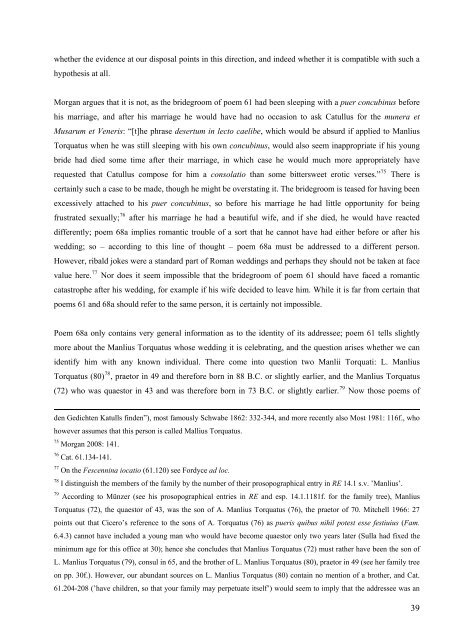CATULLUS 68 - Scuola Normale Superiore
CATULLUS 68 - Scuola Normale Superiore
CATULLUS 68 - Scuola Normale Superiore
You also want an ePaper? Increase the reach of your titles
YUMPU automatically turns print PDFs into web optimized ePapers that Google loves.
whether the evidence at our disposal points in this direction, and indeed whether it is compatible with such a<br />
hypothesis at all.<br />
Morgan argues that it is not, as the bridegroom of poem 61 had been sleeping with a puer concubinus before<br />
his marriage, and after his marriage he would have had no occasion to ask Catullus for the munera et<br />
Musarum et Veneris: “[t]he phrase desertum in lecto caelibe, which would be absurd if applied to Manlius<br />
Torquatus when he was still sleeping with his own concubinus, would also seem inappropriate if his young<br />
bride had died some time after their marriage, in which case he would much more appropriately have<br />
requested that Catullus compose for him a consolatio than some bittersweet erotic verses.” 75 There is<br />
certainly such a case to be made, though he might be overstating it. The bridegroom is teased for having been<br />
excessively attached to his puer concubinus, so before his marriage he had little opportunity for being<br />
frustrated sexually; 76 after his marriage he had a beautiful wife, and if she died, he would have reacted<br />
differently; poem <strong>68</strong>a implies romantic trouble of a sort that he cannot have had either before or after his<br />
wedding; so – according to this line of thought – poem <strong>68</strong>a must be addressed to a different person.<br />
However, ribald jokes were a standard part of Roman weddings and perhaps they should not be taken at face<br />
value here. 77 Nor does it seem impossible that the bridegroom of poem 61 should have faced a romantic<br />
catastrophe after his wedding, for example if his wife decided to leave him. While it is far from certain that<br />
poems 61 and <strong>68</strong>a should refer to the same person, it is certainly not impossible.<br />
Poem <strong>68</strong>a only contains very general information as to the identity of its addressee; poem 61 tells slightly<br />
more about the Manlius Torquatus whose wedding it is celebrating, and the question arises whether we can<br />
identify him with any known individual. There come into question two Manlii Torquati: L. Manlius<br />
Torquatus (80) 78 , praetor in 49 and therefore born in 88 B.C. or slightly earlier, and the Manlius Torquatus<br />
(72) who was quaestor in 43 and was therefore born in 73 B.C. or slightly earlier. 79 Now those poems of<br />
den Gedichten Katulls finden”), most famously Schwabe 1862: 332-344, and more recently also Most 1981: 116f., who<br />
however assumes that this person is called Mallius Torquatus.<br />
75<br />
Morgan 2008: 141.<br />
76<br />
Cat. 61.134-141.<br />
77<br />
On the Fescennina iocatio (61.120) see Fordyce ad loc.<br />
78<br />
I distinguish the members of the family by the number of their prosopographical entry in RE 14.1 s.v. ’Manlius’.<br />
79<br />
According to Münzer (see his prosopographical entries in RE and esp. 14.1.1181f. for the family tree), Manlius<br />
Torquatus (72), the quaestor of 43, was the son of A. Manlius Torquatus (76), the praetor of 70. Mitchell 1966: 27<br />
points out that Cicero’s reference to the sons of A. Torquatus (76) as pueris quibus nihil potest esse festiuius (Fam.<br />
6.4.3) cannot have included a young man who would have become quaestor only two years later (Sulla had fixed the<br />
minimum age for this office at 30); hence she concludes that Manlius Torquatus (72) must rather have been the son of<br />
L. Manlius Torquatus (79), consul in 65, and the brother of L. Manlius Torquatus (80), praetor in 49 (see her family tree<br />
on pp. 30f.). However, our abundant sources on L. Manlius Torquatus (80) contain no mention of a brother, and Cat.<br />
61.204-208 (’have children, so that your family may perpetuate itself’) would seem to imply that the addressee was an<br />
39






